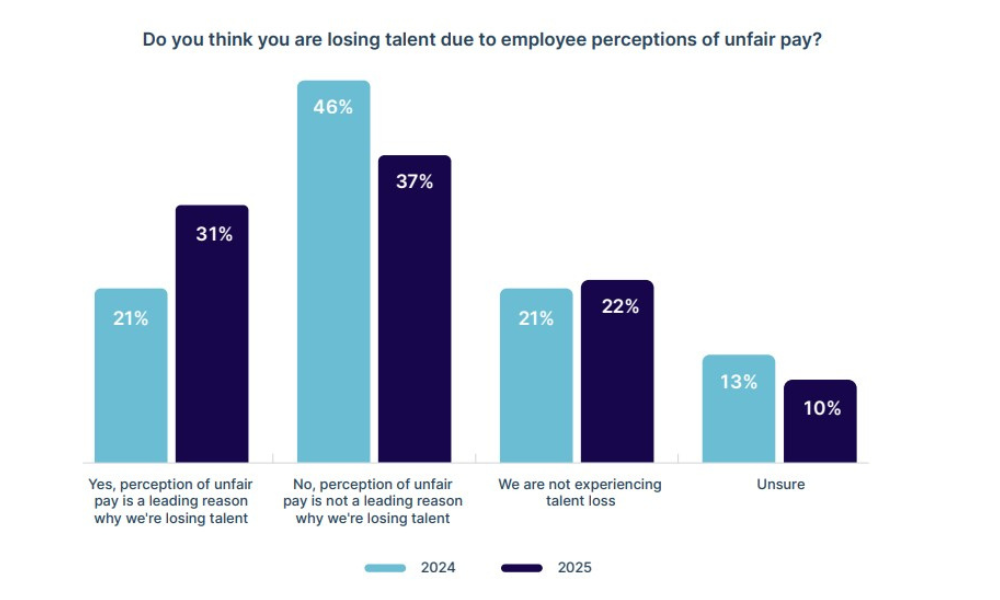Workplace loyalty is dead. Or so, that is what the numbers will have you believe. Nearly a third of employees are quitting within the first six months. This is a drastic change in comparison to the average worker staying at a company for over six years just a decade prior.
But is it really that employees today no longer want to work? Or are companies failing to understand the needs of the modern workforce?
Table of Contents
Why Are Employees Less Loyal Today?
Understanding why employee loyalty is declining is the first step to countering the problem. Rather than simply chalking up the problem to laziness or a generational divide, employers need to actively listen to their teams out and understand what issues they may be having. There are some common issues that lead to poor employee retention rates.
Lack of Job Security
The current job market is unstable and uncertain. This is especially true in the post-pandemic period. Employees fear layoffs and organizational restructuring. This has led to diminishing loyalty, especially after they have seen massive layoffs in the past few years. Without stability, they are inclined to seek more secure employment elsewhere. This undermines their ability to engage with and commit to their current organization.
Career Advancement
Employees crave opportunities for growth and development. They want to know that their time in a company will pay off, and they will be able to climb the corporate ladder. When career progression is limited or nonexistent, they may feel stagnant and unfulfilled. They will seek better opportunities elsewhere. These employees will be disengaged and will not feel loyal to the organization.
Insufficient Compensation
Low pay is a major factor for an employee leaving your company, especially in the modern economic landscape. Ultimately, your employees work for you because they want to be compensated. If you are offering salaries and benefits significantly below the industry standard, they will look for work elsewhere. A person who may be struggling to pay their bills will not be considering company loyalty and may even build resentment towards your organization. Inadequate compensation not only affects morale but also undermines loyalty and motivation to stay with the company long-term.

Work-life Balance
A healthy balance between work and personal life is essential for employee well-being. Work-life balance allows them to not get overwhelmed by their job. Breaks are necessary to boost their mental health and keep them engaged. Organizations that prioritize flexibility and accommodate employees’ personal needs are able to retain employees for longer.
Cultural Mismatch
When employees’ values and beliefs don’t align with the organization’s culture, it creates a sense of disconnect and discomfort. Without a cultural fit, employees may struggle to integrate and engage fully. Your employees should understand your values and be enthusiastic about them. Employers should also be able to effectively communicate and reinforce their values and make sure that their employees benefit their staff.
Changing the Mindset
If there is one thing you should gauge from the kind of problems that employees commonly have with their workplaces, it is that they feel undervalued. A lack of job security, a lack of opportunity, a lack of respect for their time and a lack of fair compensation are the biggest problems they have.
Your staff is not disloyal. They do not feel that the company is loyal to them. Two-thirds of employees feel undervalued by their organization.
As inflation reaches an all-time high, employees are not raising wages at the same rate. This has decreased the value of employers for most workers. Businesses need to reestablish the value they bring to their staff. Compensation is a big part of this, but so are factors like allowing your workers time off, advancement opportunities, and job security.
Why it’s Bad for Your Company
If your employees are not loyal to your company, it can have long-term implications on both your reputation and your operations.
Cost and Efficiency
Cost and efficiency are intertwined aspects of business operations. By optimizing processes and resource allocation, organizations can minimize expenses while maximizing output. Efficient operations reduce waste, streamline workflows, and ultimately contribute to improved profitability. Investing in efficiency measures is crucial for maintaining competitiveness and long-term sustainability in today’s dynamic business environment.

Decreased Morale
Decreased morale can have significant repercussions on organizational performance. When employees feel disengaged or demotivated, productivity suffers, leading to missed deadlines and lower-quality work. Additionally, low morale can contribute to higher turnover rates as employees seek more fulfilling opportunities elsewhere. Addressing morale issues is essential for maintaining a positive and productive work environment.
Loss of Knowledge
Loss of knowledge due to employee turnover can be detrimental to an organization. Experienced employees possess valuable insights, skills, and institutional knowledge accumulated over time. When they leave, this knowledge leaves with them, potentially impacting productivity, decision-making, and the ability to innovate, creating gaps that are challenging to fill.
Company Reputation
High turnover rates can damage a company’s reputation, signaling instability or dissatisfaction within the organization. This negative perception may deter top talent from applying and could even impact customer trust and loyalty. A tarnished reputation can hinder growth opportunities and diminish the company’s standing in the industry.
How to Improve Employee Loyalty
With an understanding of what employees really want, you can approach different ways to improve your employee retention rates. Each solution you implement should directly address a problem that your team has.
Payscale and Incentive Programs
Payscale and incentive programs play a pivotal role in attracting and retaining top talent. Competitive compensation packages will make your employees feel acknowledged. They are a tangible incentive and a way to appreciate your employees. An employee who is not having to worry over each paycheck is likely to feel more comfortable in their position.
Incentive programs, such as bonuses, profit-sharing, or performance-based rewards, motivate employees to strive for excellence. By aligning pay with performance, organizations create a culture of meritocracy and achievement. Transparent and fair compensation practices build trust and satisfaction among employees, reinforcing their commitment to the company and reducing turnover rates in the long run.
Uplifting Work Environment
Coming to work every day should not feel like a drag or burden. Regardless of compensation, most people will not be able to stay loyal to a place that puts them in a bad mood every day. When you are expected to spend much of your day at work, it is only fair to expect positivity and support.
Create a workplace where individuals feel valued, respected, and motivated to excel. Team-building activities and recognition programs encourage staff to interact with each other and develop a deeper understanding. This will uplift employees’ spirits and enhance their sense of belonging.

It is also essential to be able to recognize disruptive and disrespectful behavior. Employees that engage in this often should be dealt with effectively to maintain the pleasant atmosphere for others.
In such an environment, there is a shared sense of purpose and unity that can drive productivity and collaboration. Employees are more likely to feel inspired to contribute their best efforts when they feel uplifted by their surroundings, leading to greater job satisfaction and loyalty to the organization.
Respectful Management
Respectful management is foundational to a healthy work environment. Train your managers to listen actively to employees’ concerns, treat them with dignity, and recognize their contributions. Managers need to give their teams space to express their opinions and ideas.
When management practices respect, it is able to develop a trusting relationship that is based on open communication. A good manager is the bridge between employees and executives. They should be encouraged to not just enforce the requirements of executives but also to raise the concerns of the employees. This will empower their team to voice their opinions and ideas without fear of reprisal.
Respectful leaders lead by example. Your managerial staff must demonstrate integrity and fairness in their interactions. Such management not only boosts morale but also cultivates a sense of loyalty among employees, as they feel supported and respected in their roles. Your team should not feel like they are held to a different standard than others.
Opportunities for Internal Growth
Often, your employees are leaving your organization because a different company is offering a higher position. However, if they see a clear path for advancement within their organization, they are more motivated to invest in their careers and stay with you for longer.
Internal growth opportunities can include mentorship programs, training sessions, and promotion pathways. You can also offer development opportunities like courses to your workers.

Nurturing talent demonstrates your company’s commitment to employee development and retention. Employees who feel supported in their professional growth are more likely to remain loyal to the company, as they see it as a place where they can achieve their career goals and realize their full potential. Make sure that your employees have a regular timeline by which they can expect to reach their career goals within your organization. An uncertain promise of promotions will not seem authentic to them.
Increased Engagement
Your employees should feel engaged at work. This is an activity they engage with for most of the day. If they do not feel actively engaged and emotionally invested in their work, they will not be putting in as much effort.
Organizations can foster engagement through various initiatives that teach the employee more about the work they are doing. Providing opportunities for skill development and mentorships is an important aspect of this.
Your employees should also feel a sense of purpose and connection to their roles. The overall mission of the organization should resonate with them. Apart from hiring the right employees, communication is also key. Make sure your team knows the direction your company is going, what your objectives are, and what particular projects are contributing too. Regularly reinforce your mission and purpose.
These steps will lead to higher levels of productivity and job satisfaction. You will see lower turnover rates and higher levels of loyalty, as employees are more likely to remain committed to a workplace where they feel valued and engaged.
Have a vision for your business? Let us help you get started! At EvolveDash, we’re passionate about helping businesses grow and evolve in the digital world. Our team is here to help every step of the way, from developing custom mobile apps to creating personalized websites.
With a proven track record of helping over 100 satisfied customers and 450 completed projects, we’re confident we can help you achieve your goals too. Let’s turn your business vision into success!
FAQs
- How does remote work affect employee loyalty?
Remote work can increase flexibility and job satisfaction, but it may also reduce a sense of belonging if not managed well.
- Does employee loyalty differ across industries?
Yes, industries with rapid career progression (e.g., tech) may see higher turnover, while stable fields (e.g., government jobs) tend to retain workers longer.
- Can company loyalty be regained once it’s lost?
Yes, businesses can rebuild trust through better communication, fair compensation, and a positive work environment.
- Do younger employees care less about loyalty?
Not necessarily. Younger workers value purpose, growth, and fair treatment, but they are less willing to stay in unfavorable conditions.
- How can small businesses retain employees without large budgets?
They can offer non-monetary benefits like flexible schedules, skill development, and a strong company culture to keep employees engaged.



















